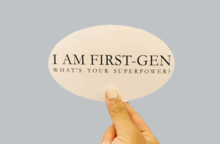Supporting Graduate Students' Academic and Professional Success

Being a first-generation college student is a never-ending identity that serves as a source of strength and inspiration. Still, it can come with much ambiguity and, just like in your undergraduate years, that ambiguity can limit your ability to thrive in graduate school too. Here are some tips and resources to help you succeed as a first-generation graduate student at UCR.

[Image Depicted: a hand holds up text balloon printed with the words "I am first-gen - what's your superpower?"]
Pictured: Claim your superpower!
Be Proactive About Seeking Academic Support Early and Often
Adjusting to the academic demands of graduate school can be a daunting task, but it is manageable if you put yourself in a position to receive academic support before running into trouble. Your fellow graduate students can be an incredible resource and will be people you collaborate with, see at conferences, and who let you know about professional opportunities throughout your career. It is always a good idea to put yourself on your professors' radar too. They can provide you with research and funding opportunities now and, later in your career, will also serve as recommenders in your professional applications. So start to build relationships with a number of people in and beyond your department early on!
Staying on top of your academics is much easier than playing catch-up: if you are concerned that you might be slightly behind in some academic competencies such as reading, writing, or data analysis, do not hesitate to seek help! UCR has many academic support services geared specifically to graduate student needs. The Graduate Writing Center and GradQuant are especially useful. Here you can further your writing and/or quantitative skills through individual consultations, drop-in hours, and workshops. If you ever want to obtain research support and stay up to date with the ever-expanding literature in your field, the UCR Library is the place to go. They have consultations where you can learn how to use library databases and citation and reference managers such as Zotero, Mendeley , and Endnote. Using a citation manager will help you stay organized and save you tons of time when writing your dissertation or working on an article.
Get Involved with a Campus Organization
Thriving in graduate school is not only about academics. It is also important to feel like a member of a learning community. You might want to join an organization like the Association for Women in Science (AWIS) or your departmental GSA. Feel like too much of a time commitment? Just commit to coffee! You can take a break on Wednesdays at 3pm with the Graduate Student Resource Center coffee socials - they are online for summer but will be serving actual coffee and snacks to graduate students in the Life Sciences Courtyard come Fall.
The UCR Student Recreation Center (SRC) has many classes and activities where you can find people with similar outdoor and athletic interests. Intramural sports are included in your SRC membership should you want to find a like-minded group of competitors to blow off steam. If you find yourself struggling with building a sense of community and need somebody to talk to, people at The WELL are always willing to assist you. The WELL also offers relaxing events and wellness-oriented giveaways to help give your mind a break from your daily routine. Check them out!
[Image Depicted The Sesame Street Muppets wave hello while a young non-Muppet girl smiles in their midst.]
Pictured: When the weird in you recognizes the weird in other people, that's when you've found your community!
Find a Mentor(s)
Sometimes academia feels like a map written in codes. Not having immediate family members to help you navigate the challenges associated with graduate school does not mean that you must undergo this experience alone. Finding mentors who can help you to decipher the do’s and don’ts of your discipline and profession can save you a lot of time and headaches along the road. From advising you on what fellowships to apply for and which professors to build relationships with, to simply introducing you to good spots to eat or shady shortcuts on campus, mentor(s) can help you establish a community and feel supported during your time at UC Riverside. Ideally, your department will have advanced students in your discipline who can potentially serve as mentors, but if they do not, UC Riverside’s Graduate Student Mentorship Program and UC Riverside’s Ethnic and Gender Offices offer opportunities to build mentorship relations in formal and informal settings. Check them out!
[Image Depicted: Orlando Jones as Mr. Nancy in American Gods opens a folded paper map, stares, and then turns it upside down.]
Pictured: Even Mr. Nancy could use a mentor to help him read the map to succeeding in academia.
Concluding Thoughts
The experiences of first-generation graduate students are each unique. Yes, impostor syndrome in graduate school is a real thing, but you are more than capable of excelling at UCR. You have a community of people rooting for you. Your department admissions committee and your faculty advisor did not make any mistakes in admitting you. Graduate school is all about taking initiative and ownership of your education. Being proactive about receiving academic support, becoming involved on campus, and finding mentors are all practical ways to ensure that you are equipped to adapt and overcome some of the most common challenges graduate school presents for first-generation graduate students.